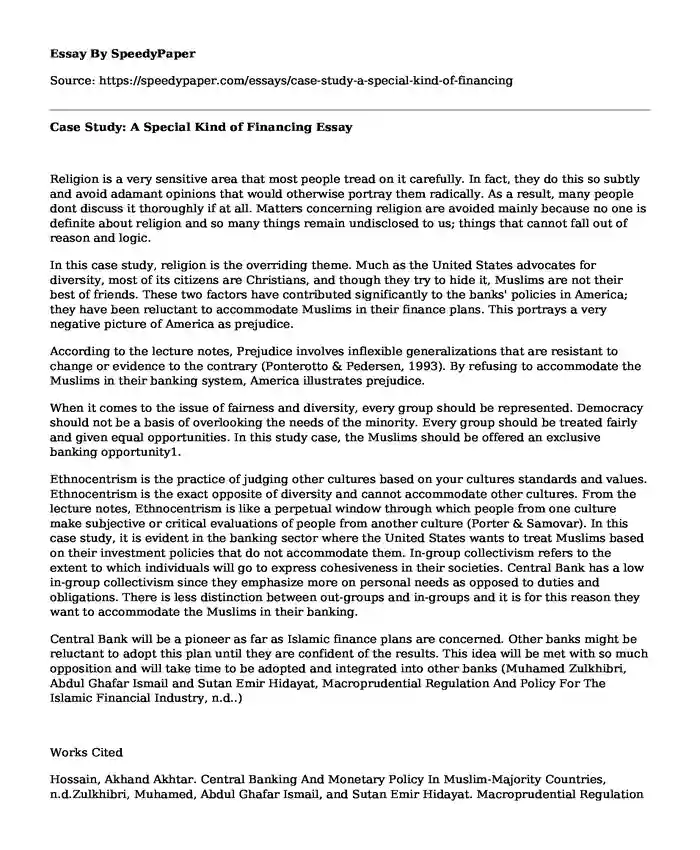Religion is a very sensitive area that most people tread on it carefully. In fact, they do this so subtly and avoid adamant opinions that would otherwise portray them radically. As a result, many people dont discuss it thoroughly if at all. Matters concerning religion are avoided mainly because no one is definite about religion and so many things remain undisclosed to us; things that cannot fall out of reason and logic.
In this case study, religion is the overriding theme. Much as the United States advocates for diversity, most of its citizens are Christians, and though they try to hide it, Muslims are not their best of friends. These two factors have contributed significantly to the banks' policies in America; they have been reluctant to accommodate Muslims in their finance plans. This portrays a very negative picture of America as prejudice.
According to the lecture notes, Prejudice involves inflexible generalizations that are resistant to change or evidence to the contrary (Ponterotto & Pedersen, 1993). By refusing to accommodate the Muslims in their banking system, America illustrates prejudice.
When it comes to the issue of fairness and diversity, every group should be represented. Democracy should not be a basis of overlooking the needs of the minority. Every group should be treated fairly and given equal opportunities. In this study case, the Muslims should be offered an exclusive banking opportunity1.
Ethnocentrism is the practice of judging other cultures based on your cultures standards and values. Ethnocentrism is the exact opposite of diversity and cannot accommodate other cultures. From the lecture notes, Ethnocentrism is like a perpetual window through which people from one culture make subjective or critical evaluations of people from another culture (Porter & Samovar). In this case study, it is evident in the banking sector where the United States wants to treat Muslims based on their investment policies that do not accommodate them. In-group collectivism refers to the extent to which individuals will go to express cohesiveness in their societies. Central Bank has a low in-group collectivism since they emphasize more on personal needs as opposed to duties and obligations. There is less distinction between out-groups and in-groups and it is for this reason they want to accommodate the Muslims in their banking.
Central Bank will be a pioneer as far as Islamic finance plans are concerned. Other banks might be reluctant to adopt this plan until they are confident of the results. This idea will be met with so much opposition and will take time to be adopted and integrated into other banks (Muhamed Zulkhibri, Abdul Ghafar Ismail and Sutan Emir Hidayat, Macroprudential Regulation And Policy For The Islamic Financial Industry, n.d..)
Works Cited
Hossain, Akhand Akhtar. Central Banking And Monetary Policy In Muslim-Majority Countries, n.d.Zulkhibri, Muhamed, Abdul Ghafar Ismail, and Sutan Emir Hidayat. Macroprudential Regulation And Policy For The Islamic Financial Industry, n.d.
Cite this page
Case Study: A Special Kind of Financing. (2019, Nov 25). Retrieved from https://speedypaper.net/essays/case-study-a-special-kind-of-financing
Request Removal
If you are the original author of this essay and no longer wish to have it published on the SpeedyPaper website, please click below to request its removal:
- Compare and Contrast Essay Sample
- Management Summary. Free Essay Sample.
- Essay Sample on Mandated Curriculum for Training Children
- Reviewing Knowledge in Biology, Free Paper Sample
- Essay Sample on Special Education Teacher Recruitment
- Free Essay about Controversies Regarding Morning After-pills for Underage Teens
- Free Essay Example: Christian and Pagan Elements in Beowulf
Popular categories





